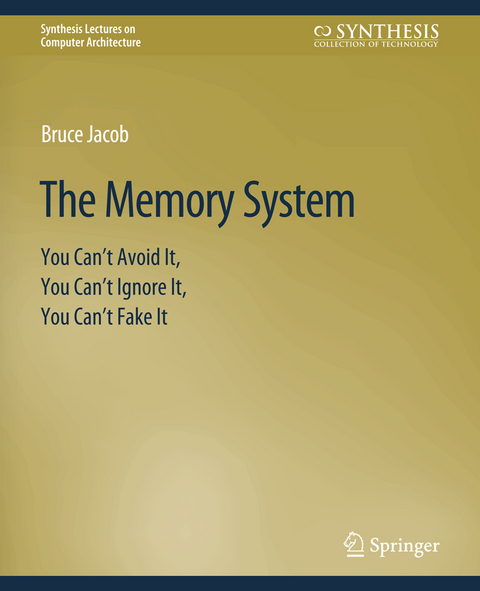
The Memory System
Springer International Publishing (Verlag)
978-3-031-00596-1 (ISBN)
Bruce Jacob is an Associate Professor and Director of Computer Engineering in the Dept. of Electrical and Computer Engineering at the University of Maryland, College Park. He received his Ars Baccalaureate, cum laude, in Mathematics from Harvard University in 1988, and his M.S. and Ph.D. in Computer Science and Engineering from the University of Michigan in 1995 and 1997, respectively. In addition to his academic credentials, he has extensive experience in industry: he designed real-time embedded applications and real-time embedded telecommunications architectures for two successful Boston-area startup companies: Boston Technology (now part of Comverse Technology) and Priority Call Management (now part of uReach Technologies). At Priority Call Management he was employee number 2, the system architect, and the chief engineer; he built the first working prototype of the company's product, and he built and installed the first actual product as well. In recognition of Prof. Jacob's research program, he has been honored several times as a University of Maryland "Rainmaker." In memory-systems research, Jacob's cache and memory- management designs demonstrated the viability of software-managed caches in general-purpose systems (he coined the now-common term "software-managed cache" in a 1998 ASPLOS paper). His work in advanced DRAM architectures at Maryland is the first comparative evaluation of today's memory technologies, and he received the CAREER Award from the National Science Foundation for his early work in that area. Honors for his teaching include the departmental George Corcoran Award, the University of Maryland Award for Teaching Excellence, and his 2006 induction as a Clark School of Engineering Keystone Professor. He has published over 50 papers on a wide range of topics, including computer architecture and memory systems, low-power embedded systems, electromagnetic interference and circuit integrity, distributed computing, astrophysics, and algorithmic composition. His recently published book on computer memory systems (Jacob, Ng, and Wang: Memory Systems-Cache, DRAM, Disk, Morgan Kaufmann Publishers, Fall 2007) is large enough to choke a small elephant.
Primers.- It Must Be Modeled Accurately.- ... and It Will Change Soon.
| Erscheinungsdatum | 06.06.2022 |
|---|---|
| Reihe/Serie | Synthesis Lectures on Computer Architecture |
| Zusatzinfo | VIII, 69 p. |
| Verlagsort | Cham |
| Sprache | englisch |
| Original-Titel | The Memory System |
| Maße | 191 x 235 mm |
| Gewicht | 171 g |
| Themenwelt | Mathematik / Informatik ► Informatik ► Theorie / Studium |
| Technik ► Elektrotechnik / Energietechnik | |
| ISBN-10 | 3-031-00596-1 / 3031005961 |
| ISBN-13 | 978-3-031-00596-1 / 9783031005961 |
| Zustand | Neuware |
| Haben Sie eine Frage zum Produkt? |
aus dem Bereich


